After almost a decade of no increases and a lengthy consultation period, the Minimum Wages Board has declared a landmark increase in Papua New Guinea’s minimum wage. Charlotte Armstrong reports.

Workers in sectors like manufacturing, retail and security are set to benefit from the minimum wage increase. Credit: BAI
Papua New Guinea’s minimum wage will increase by more than 50 per cent over the next three years, the Minimum Wages Board announced on 11 September following a lengthy consultation period.
A phased increase will see the minimum wage rise from K3.50 to K5 per hour on 1 January 2026, with further increases to K5.25 per hour in January 2027 and K5.50 per hour in January 2028, the Board announced.
“We urge all employers to comply with the new determination”
This represents the first increase to PNG’s minimum wage since 1 July 2016, when it was raised to its current rate, and was the result of public hearings held over the last two years in over 20 locations.
Beverley Doiwa, Chairperson of the Minimum Wages Board, noted in the board’s announcement that one of the major factors influencing the decision was the rising cost of living.
The move has been broadly welcomed by business groups.
John Byrne, President of the Lae Chamber of Commerce and Industry, tells Business Advantage PNG that the change was “reasonable and sets a proper platform for our people”.
While he noted that many of his members were already paying their workers rates well above the current minimum wage, Rio Fiocco, President of the Port Moresby Chamber of Commerce and Industry, agreed an increase was “overdue.”
“It’s hard for workers in Port Moresby, Lae and Mt Hagen to survive on the current rate of K3.50 an hour. This will benefit workers in sectors like retail and security especially.”
The ‘grey economy’
While making a decision is one thing, compliance is another. In its statement, the Minimum Wages Board advocated for stronger oversight and regulation of the minimum wage by PNG’s Department of Labour and Industrial Relations, with Doiwa highlighting the “alarming number of employers that operate on the periphery, within a regulatory gap caused by weak enforcement and oversight.”
These businesses, according to Doiwa, regularly fail to meet their statutory obligations, such as paying both the minimum wage and taxes.
“[It creates] unfair competition and [undermines] local enterprise,” she said.
This sentiment is shared by businesses, with Fiocco noting, “We would hope the Department of Labour will enforce the existing and increased rates – anecdotally, some companies are currently paying K2 or less, which is against the law.”
“It is taxes that funds roads, power and other vital services,” asserts John Byrne. “These illegal operators must be addressed, ensuring our people are paid and rewarded appropriately and proper taxes are also paid.”
Moving forward
Byrne praised Doiwa and the board for taking on the challenge of increasing wages and providing a balanced decision which “protects our staff currently on minimum wages, while holding cost pressures on goods at the stores and businesses and services.”
Nevertheless, he notes, businesses will need to make adjustments in order to accommodate the increase in wages.
“There will be some legitimate businesses who may have to adjust their rates or pricing, and they will do so through the right channels,” he says.
“Staging the increases also means businesses have certainty into 2027 and 2028 as well. It’s a fair decision all round,” says Fiocco.
The new minimum wage will come into effect after gazetting, which is expected to occur no later than 1 January 2026, according to the Minimum Wage Board’s announcement.
“We urge all employers to comply with the new determination,” Doiwa said.








Speak Your Mind